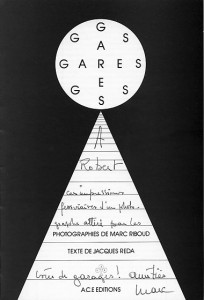Sunday, October 9th 1983
My dear Marc,
I like your railroad sign* a lot. In the pedestrian of Paris collection, it’s surely the one I find the most touching. Yes of course, the images wander harmoniously between graphic balance and emotion. But I am not a distributor of diplomas. Fortunately, I still have enough modesty and sense of the ridiculous to refrain from blessing or excommunicating.
Still, I can nonetheless say that your choice of railway stations, like all places where people have suffered, seems to me ennobled by past heartbreak.
Why have the memories of separations marked me more deeply than those of happy reunions? Perhaps because my astonishment at confronting tragedy, like being decked out in an outfit that’s too big for me, hasn’t completely evaporated. You see, in 1939, my Gare de l’Est was only Reuilly train station—I hadn’t even the right to conventionality, my sorrow had to make do with mediocre surroundings.
And so your images come to stir my own somewhat faded ones. Instead of buying kilometers at a ticket window, you offer a bit of your own lifetime. It’s much more touching to be the chrono pelican*.
Are you the one who chose Jacques Réda? Strangely enough, one of his phrases is rattling around in my head, it’s “the stairway where night had lain in wait”. It’s just a line, I no longer know what to attach this bunch of words to, but I find it beautiful.
His text in your book is superb. If you are the one who chose the writer, it was an inspired choice.
Cheers, Marc! Time has us in its sights, we must open our eyes.
All the best,
Robert Doisneau
* Doisneau is thinking of the railroad timetables printed by SNCF to inform the travellers. Marc Riboud had just sent him his new book Gares et trains (text by Jacques Réda, ACE Editeur, 1983) with this dedication:
*His allusion to the «chrono pélican» refers to a poem by Alfred de Musset (La nuit de mai,1835):
Lorsque le pélican lassé d’un long voyage,
Dans les brouillards du soir retourne à ses roseaux (…)
[When the pelican, weary from his long voyage,
Returns to his reeds in the mist of the evening (…)]

